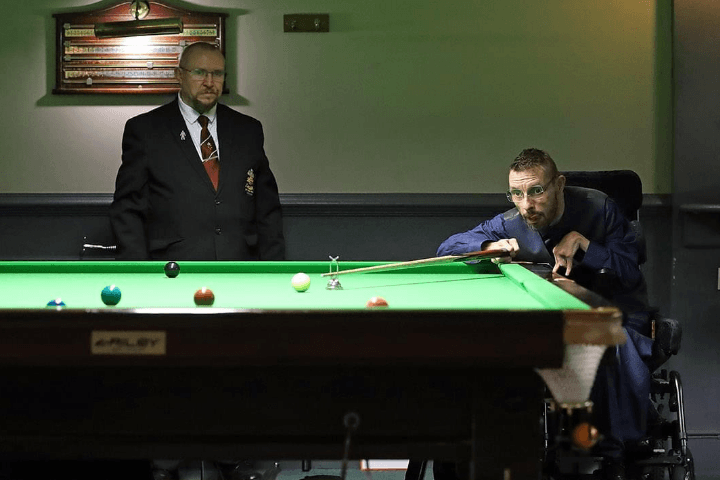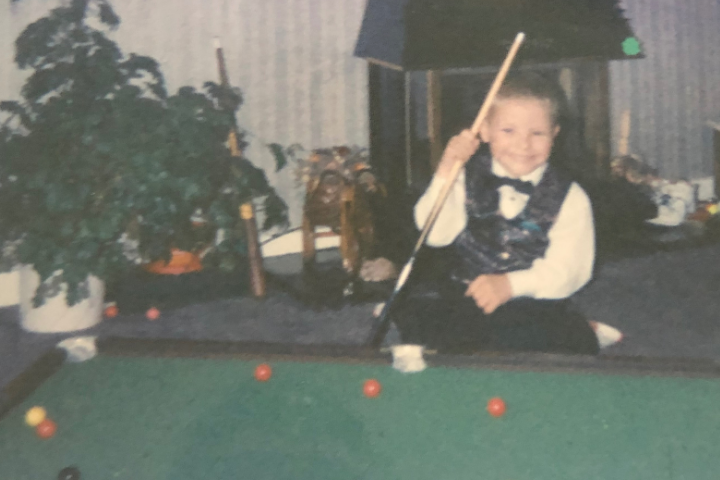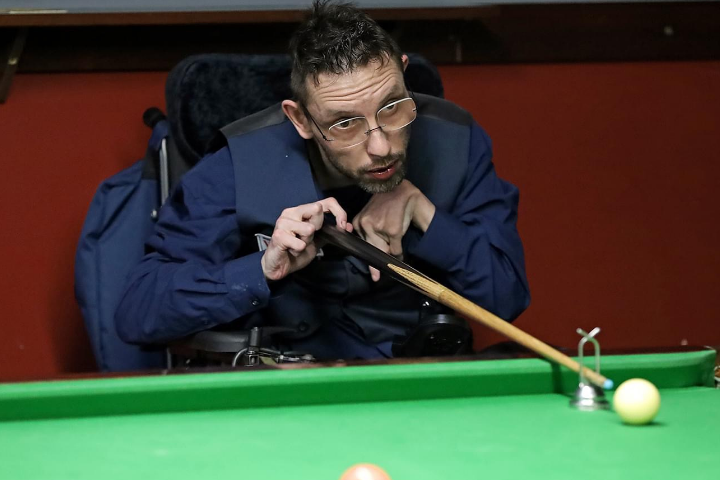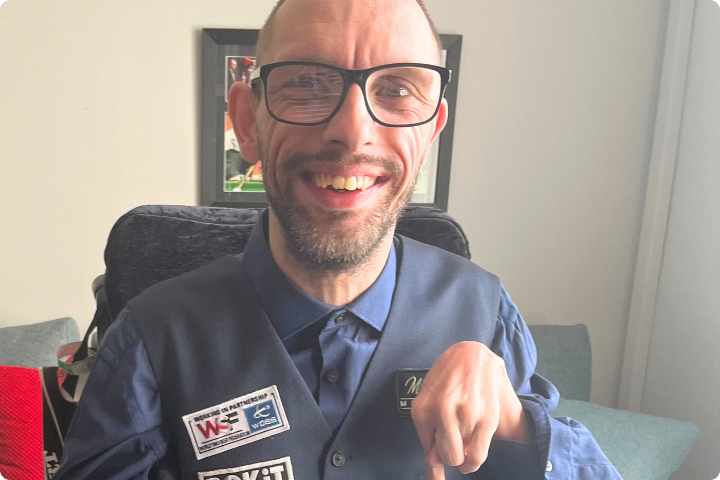All Articles
5 min read
Taking World Disability Snooker by Storm – The Doncaster Destroyer
Written by
Matt Lester
Published on
January 13, 2025

Hi there, my name is Matthew Lester. I am a disability activist and I’m passionate about improving access. I have Cerebral Palsy and I am 36 years old. My Cerebral Palsy means I cannot walk, so I use a power chair full time and I have very limited use of my left arm. I am a snooker player and I am World No.11 in the wheelchair snooker world rankings on the World Disability Snooker Tour.
Let me take you back over thirty years ago, when I started playing snooker at 18 months old (according to my mum, and she’s a very reliable source) with three marbles and a knitting needle. By the time I was 4, I got a tiny snooker table, which meant my mum could carry on with her knitting in peace while I pretended to be Steve Davis or Jimmy White.
The only time I would do any form of exercise on my left arm was when I was playing snooker on this tiny table, no matter how much I was threatened by the physio that “if you don’t do your physio, you won’t be able to use your left arm when you’re older.” My response was always “I don’t care. That’s when I’m older”
Fast forward to the early 2000’s, and I was watching snooker on the BBC, and they showed 2 minutes of a wheelchair snooker tournament. Crucially, for a few seconds I saw someone playing shots one handed using a gadget which he placed on the table. That was it! Suddenly I didn’t have to imagine I was Jimmy White playing at the Crucible. I could play in tournaments and be a proper snooker player myself.

The next day I went to my secondary school and asked my learning support assistant to find me some information on snooker. I was very lucky that, at the time my school was keen to encourage disability sport among the few students with disabilities. I was 13 when I entered that first tournament in Wakefield and I was playing against men in their 50’s and 60’s but I loved it and wanted more.
Around this time I started using the Cannon Aid, which is a snooker, billiards and pool disability aid that was invented by a disabled person and allows wheelchair users, people who cannot bend, people with a limb difference and people who play without any hands or arms (who use a mouth held cue stick) to play. I also had a DIY cue aid made by my uncle.
Disability snooker disappeared for a few years, so I moved across to American pool for a few years, where I had a lot of success winning tournaments, and being one of the best wheelchair players in the UK in 2017.
Just as I was set to join the newly formed World Disability Snooker Tour in 2018, I experienced some disability discrimination which set me back a good few years. On a visit to a local snooker club, my PA and I were asked to leave, the manager said that as I take longer than the average player, customers could get impatient and that it could be bad for business.
He said that I can’t expect to be able to go in there on a busy Saturday afternoon. He said he could either charge me double, or I go in when it’s closed and he opens just for me. Though I was told that I had a solid disability discrimination case, my family and I decided to not take it to court due to the stress.
In the intervening years the club where I practiced American pool in Barnsley, closed down. I would regularly be on the phone to one of my snooker heroes and I’d be asking if he had been anywhere local to me with wheelchair access, so I can practice. He would reply: “Matt, you should go on that World disability snooker tour. You don’t need pool, you’re good enough. All you need is practice, what’s stopping you?”
Internally, I would go back to the ableism incident in January 2018, it had affected my confidence and made me concerned about going to snooker clubs. But the response from my peers would always be the same “Just get on the snooker table!”

So in May 2013, inspired by my hero qualifying for the UK Championship at 60 years old, I returned to disability snooker after 18 years, at a World disability snooker tour tournament in Hull. Since then I have gradually become more active on the World Disability Snooker Tour. Recently I missed out on a place in the semi-finals of the European Championship in Portugal by just frame difference.
Being at the Euros was brilliant, and just shows how big disability snooker is growing. It was the closest to a professional atmosphere I’ve ever experienced, and I think there will be more tournaments like that in the future. The first ever disability snooker World Championship is taking place in Thailand in February 2025, this represents the latest major milestone in the continued growth of disability snooker worldwide, following snooker’s inclusion at last year’s World Abilitysport Games and the first-ever European Disability Snooker Championship in October.
Taking part in any sport can be expensive though, especially when you are disabled and so to take part in the World Championship this year, I am currently looking for sponsorship towards my hotel for this.
The practicalities of being a disabled snooker player mean I rely on my PA’s to drop me off and pick me up from the snooker club for practice sessions, and travel with me to tournaments to help me with personal care. So whilst I have the desire to want to practice three to four days a week for 5 or 6 hours, realistically I only have one regular PA who can drive my wheelchair accessible vehicle.
Inevitably because I need a PA that also adds to my travel costs to tournaments, so I rely on the sponsorship I receive, which although it helps, it doesn’t cover all of the costs, especially travelling abroad. I have run crowdfunding campaigns, but I feel uncomfortable doing these as I know people are finding the cost of living harder and harder.
A long-term aim of the World Professional Billiards and Snooker Association is to get snooker back into the Paralympics for the first time since 1988. Up until then snooker had been in the Paralympics since its inception. WDBS is committed to supporting the international expansion of disability snooker to enable the sport to return to the pinnacle of disability sport. It is often forgotten that snooker was a founder sport at the inaugural Paralympic Games in Rome 1960!

Like in the Paralympics, players on the disability snooker tour are split into 7 classifications depending on how their disability effects them on the snooker table. You can find more information about that on how the players are classified on the website here.
I would encourage anyone with an interest in snooker to give disability snooker a go. There is an open day before the start of every tournament. Whether you are a complete beginner, or maybe you played snooker before becoming disabled, there is a place for you on the World disability snooker tour. And whilst we are fiercely competitive on the base, off it we’re a friendly bunch. To get involved visit the World Disability Billiards and Snooker website here.
If you want anymore info, or just to chat I am on most social media sites, just search Matthew Lester and you can follow my snooker Facebook page for Matthew “Doncaster Destroyer” Lester here!
Thanks for reading,
Matt
About World Disability Billiard and Snooker
World Disability Billiards and Snooker (WDBS) was founded in 2015 to give more people with disabilities the opportunity to play cue sports around the world.
WDBS was set up under the auspices of the World Professional Billiards and Snooker Association (WPBSA),with guidance from Activity Alliance, a national charity which aims to ensure that disabled people in England are active for life.
Since its formation WDBS has regularly staged several snooker events for people with disabilities across the UK and beyond. Typically run over three days, events include a mix of open days at which anyone with a disability is encouraged to attend and try snooker, as well as competitive tournaments.
Tournaments are open to people with a range of physical, learning and sensory disabilities, with players assigned to a classification group determined by their disability profile.
Other Related Articles on Sports for Disabled People
From Hospital Bed to Paralympic Dreams: Toby Richardson’s aims for Paralympic glory.
M.S, Running and Me: Jay Marie Ashby embraced running as a way to deal with her MS.
Finding Power from the Paralympics: Rob Sears and his time in the British Triathlon Paratriathlon.
